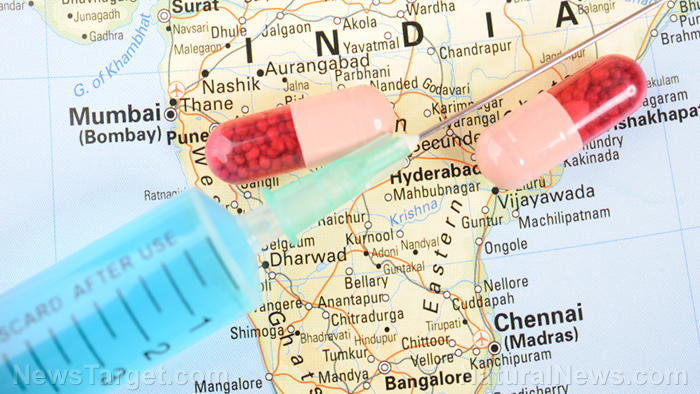Same ivermectin that US government doesn’t want Americans to receive is saving lives across India
09/17/2021 / By Ethan Huff

Uttar Pradesh, one of India’s most densely populated regions, is doing exceptionally well with the Wuhan coronavirus (Covid-19) “cases.” The reason why? Ivermectin is widely used there.
With a population of 240 million people, which is about 75 percent of the total United States population, Uttar Pradesh has had only about 24 cases of the Chinese Virus and no deaths over the past several months. This is astounding compared to what is happening throughout the West.
Among India’s 36 states, Uttar Pradesh boasts being dead last on the list of infected states. Once again, the reason for this is simple: ivermectin is not a dirty word there like it is in the U.S.
“Evidently, the global medical junta doesn’t like the over 60 studies vouching for the efficacy of ivermectin against SARS-CoV-2, especially when used early, but there is something better than a study: pure reality of lived experience,” writes Daniel Horowitz for Blaze Media.
Beginning in late 2020, authorities in Uttar Pradesh began liberally dispensing ivermectin to people, urging them to take it early on at the first signs of a possible infection and even preventatively. This advice turned out to be solid.
“By the end of 2020, Uttar Pradesh – which distributed free ivermectin for home care – had the second-lowest fatality rate in India at 0.26 per 100,000 residents in December. Only the state of Bihar, with 128 million residents, was lower, and it, too, recommends ivermectin,” reported Trial Site News.
Covid is gone from Uttar Pradesh, thanks to ivermectin
For a “horse de-wormer,” ivermectin sure did help Uttar Pradesh avoid a major crisis. Ever since the drug was introduced there, the Fauci Flu has pretty much been eradicated.
Nobody is dying from Chinese Germs there because they are gaining protection from the use of ivermectin, which has repeatedly been shown as effective against the Wuhan Flu.
“Uttar Pradesh likely would have been the first world experiment of what a given area would have looked like had they been taking ivermectin from day one before a wave hit,” Horowitz explains.
“Unfortunately, hundreds of thousands of seasonal migrants fled Mumbai and other big cities when the Delta wave hit and all settled back in their villages in Uttar Pradesh, giving them the same spike that every other state got because those people were not on ivermectin.”
As of now, there has still not been a proper case study using an actual population like this to demonstrate the power of ivermectin to put an end to the plandemic.
This is unfortunate because we could have been long done with this nonsense ages ago, were it not for the corrupt political influence that is keeping ivermectin out of the hands of the people, particularly in the West.
There would be no need for panic, masks, “vaccines,” or any other mindless hysteria if the “authorities” would just give up their crusade against ivermectin and let people try it. Many deaths and hospitalization could be prevented this way.
Tony Fauci and his cronies continue to try to strongarm India into accepting snake oil “remedies” like remdesivir and Donald “father of the vaccine” Trump’s “Operation Warp Speed” injections, but the country, or at least parts of it, have been resisting rather formidably.
“All trials are saying that this drug is not effective in the treatment of COVID-19, rather it is complicating and resulting in mortality of patients,” says Dr. Surya Kant Tripathi about the failure of remdesivir.
“At so many centers, remdesivir trials were stopped. Also, remdesivir is costing minimum of Rs 5,000 per vial.”
The latest news about the Wuhan coronavirus (Covid-19) plandemic can be found at Pandemic.news.
Sources for this article include:
Tagged Under: alternative medicine, antiviral, COVID, early treatment, India, infections, ivermectin, outbreak, Plandemic, remedy
RECENT NEWS & ARTICLES
Pandemic.News is a fact-based public education website published by Pandemic News Features, LLC.
All content copyright © 2018 by Pandemic News Features, LLC.
Contact Us with Tips or Corrections
All trademarks, registered trademarks and servicemarks mentioned on this site are the property of their respective owners.





















